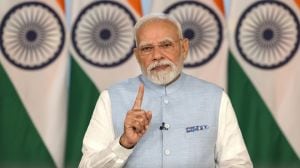Justice Desai superseded as junior makes it to Kerala HC as CJ
MUMBAI, MAY 26: In one of such rare instances of supercession in the recent history of Indian judiciary, Justice A V Sawant of the Bombay ...

MUMBAI, MAY 26: In one of such rare instances of supercession in the recent history of Indian judiciary, Justice A V Sawant of the Bombay High Court is all set to take oath as Chief Justice of the Kerala High Court, superseding Justice Ashok Desai, who was appointed as a judge four years before him and is at present a puisne judge in the Allahabad High Court. The President has reportedly approved the supercession of Justice Desai, and signed the papers of Justice Sawant.
The supercession of Justice Desai, confirmed by the Union Minister of Law and Judiciary, Ram Jethmalani today, has met with criticism in the Bombay bar with lawyers and advocates claiming that such steps undermine the independence of the judiciary.
When contacted by The Indian Express in Allahabad, Justice Desai said that since there was no official announcement on it, he was not sure that the appointment of Justice Sawant was confirmed. “If it is true, it is very unfortunate,” is all he would say. He added that, if confirmed, he would be taking a decision on it, “in course of time”.
Jethmalani, who had himself opposed the appointment of Supreme Court judge, Justice A N Ray as Chief Justice of India superseding three judges senior to him during the Emergency, was hesitant in defending this action. “We leave it to the judiciary to decide on these matters,” he said. He reiterated that he was still opposed to supercession but, “sometimes it happens”. “There is no supercession unless there are good reasons..,” he said. Asked what could be the “good reasons” in this instance, he hedged the question and repeated, “we don’t interfere in these matters, it is for the judges (collegium of the Supreme Court judges) to decide”.
The Minister confirmed that after the collegium approved the name of Justice Sawant, who was appointed as a high court judge in 1990, the ministry as well as the President has approved the appointment. Justice Sawant is due to retire on September 17, 2000. Justice Desai, on the other hand, had been appointed a judge in 1987 and is due to retire in 2004. Legal sources point out that Justice Ashok Agarwal and Justice S N Variava, both of who were Justice Desai’s contemporaries, had been elevated as Chief Justices. While Justice Agarwal retired as the Chief Justice of the Madras High Court, Justice Variava, who was elevated as the Chief Justice of the Delhi High Court is now a judge of the Supreme Court. Justice Desai, on the other hand, had been transferred to the Allahabad High Court around two and a half years back.
The judicial fraternity recalls two controversial cases of Justice Desai’s time. He had issued contempt notices against the then acting Chief Justice of the Bombay High Court, Justice M L Pendse, when a matter that was being heard by him (Justice Desai) was taken away and assigned to another bench, by the latter. The order and was challenged in the apex court which stayed the notices. The matter is yet to be decided.
The other, say lawyers, was when Justice Desai found the Sena chief Bal Thackeray guilty of contempt of court for when he declared in a public speech at Shivaji Park that one judge of the Bombay High Court had asked around Rs 35 lakh from him for deciding the Ramesh Kini case. Thackeray was sentenced to two weeks imprisonment. Kini, a victim of a landlord-tenant dispute was found mysteriously dead in a cinema hall in Pune in 1996 in a case that involved the Shiv Sena. The conviction was stayed by the apex court.
“This was a judicial order and challenged in the apex court. If for such reasons he’s being denied his due, where is the independence of the judiciary?” asked a senior counsel.
Photos





- 01
- 02
- 03
- 04
- 05

























